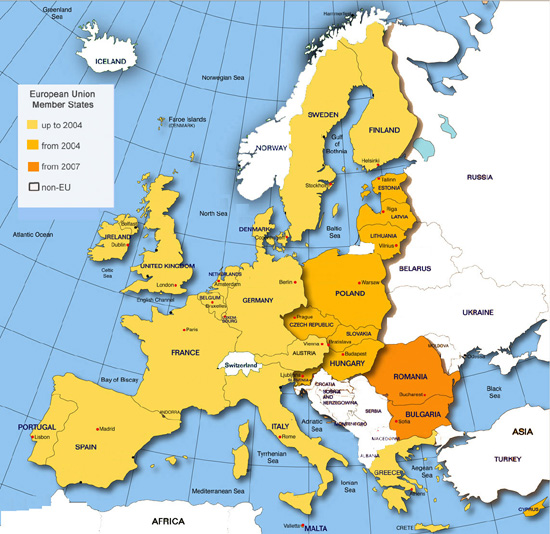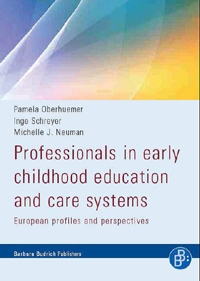Systems of early education/care and professionalisation in Europe
Research team
Pamela Oberhuemer (IFP, Project Director)
Dr. Inge Schreyer (IFP)
Tel. 0 89-99825 -1940, E-Mail: inge.schreyer@ifp.bayern.de
Dr. Michelle Neuman, International Early Childhood Specialist, Washington DC (external researcher)
E-Mail: michelleneuman@yahoo.com
Project funding by the German Federal Ministry for Family Affairs, Senior Citizens, Women and Youth
Rationale
In Germany, early education and care have moved up the policy agenda. As in many countries in Europe, the initial and continuing professional development and support of personnel working with young children are critical quality issues in a context of expansion and increasing access to provision. In the recent OECD (2006) review of early childhood education and care in 20 countries, staffing of early childhood centres is described as the "key to quality services". There is considerable interest among policy administrators, researchers, early years practitioners and those responsible for early childhood professional studies to learn more about approaches and transformation processes in other European countries. At the same time, the research and resource base with a cross-national focus on staff profiles and professionalisation strategies is limited.
Aims and research focus
Who works in early childhood settings? What are the professional study routes required for core practitioners, centre leaders and support staff in these settings? What are the main similarities and differences in professional profiles across countries? What chances do practitioners have for continuing professional development? What are current workforce issues around status, pay, gender, diversity? The seepro project on systems of early education/care and professionalisation in Europe based at the State Institute of Early Childhood Research (IFP) in Munich, seeks to answer such questions.
The main aims are
- to access, systematise and analyse data on the professional profiles of core practitioners working in early childhood provision;
- to contextualise these profiles and professionalisation patterns within country-specific histories of early childhood education and care, demographic trends and structural features of the ECEC system, and current issues and challenges facing early childhood practitioners.
Funded by the German Federal Ministry of Family and Youth Affairs, the project focuses in particular on professional profiles in the newer EU member states - Bulgaria, Cyprus, the Czech Republic, Estonia, Hungary, Latvia, Lithuania, Malta, Poland, Romania, Slovak Republic and Slovenia. International comparative studies to date have paid little attention to the early childhood systems in these countries, which have been undergoing rapid transformations during recent years.
The project format is derived from an earlier IFP study in the EU15 (Oberhuemer & Ulich, 1997) and is also updating the data base for these countries: Austria, Belgium, Denmark, Finland, France, Germany, Greece, Ireland, Italy, Luxembourg, the Netherlands, Portugal, Spain, Sweden, UK.

Research procedures
A network of co-operation partners from universities and research institutes in 27 countries has been supporting the project team's research. The affiliations of the country experts are as follows:
- Austria: Bundes-Bildungsanstalt für Kindergartenpädagogik Klagenfurt
- Belgium: University of Ghent - Resource and Research Centre for Early Childhood Care and Education
- Bulgaria: University of Sofia, Department of Pre-School Education
- Cyprus: University of Cyprus, Department of Early Childhood Education, Nicosia
- Czech Republic: Masaryk University, Faculty of Arts, Brno
- Denmark: VIA University College, Pædagoguddannelsen JYDSK
- Estonia: University of Tallinn, Faculty of Early Childhood Education, Tallinn
- Finland: University of Helsinki, Department of Applied Science of Education
- France: Université Paris-Nord
- Greece: Aristotle University of Thessaloniki, Department of Early Childhood Education
- Hungary: National Institute for Social Policy and Labour, Budapest
- Ireland: Department of Education and Science, Early Childhood Policy Unit
- Italy: University of Milan Bicocca, Milano
- Latvia: Centre for Education Initiatives, Jekabpils
- Lithuania: Centre for Innovative Education, Vilnius
- Luxembourg: University of Luxembourg, Faculty of Education, Walferdange
- Malta: University of Malta, Department of Primary Education
- The Netherlands: Free University of Amsterdam, Faculty of Psychology and Education
- Romania: University of Bucharest, Department of Preschool Pedagogy
- Poland: University of Warsaw, Faculty of Education
- Portugal: Childhood Association (Associação Criança), Braga
- Slovak Republic: Comenius University, Faculty of Philosophy, Bratislava
- Slovenia: Educational Research Institute, Ljubljana
- Spain: Children in Europe (Infância Europa), Barcelona
- Sweden: University of Göteborg, Department of Education, Göteborg
- UK: Institute of Education, University of London
Commissioned reports
Specially commissioned reports by experts in each country provide the research team with background material on the specific system of early education/care and professionalisation and enable them to conduct semi-structured interviews in each country in a focussed and informed way.
Individual commissioned reports can be accessed here:
- Commissioned report Bulgaria (PDF document, 222 KB)
- Commissioned report Cyprus (PDF document, 230 KB)
- Commissioned report Estonia (PDF document, 280 KB)
- Commissioned report Greece (PDF document, 290 KB)
- Commissioned report Lithuania (PDF document, 330 KB)
- Commissioned report Malta (PDF document, 260 KB)
- Commissioned report Portugal (PDF document, 310 KB)
- Expertenbericht Romania (PDF document, 370 KB)
- Commissioned report Slovakia (PDF document, 300 KB)
- Commissioned report Slovenia (PDF document, 280 KB)
Research visits
During five-day visits to the country, members of the project team interview a range of stakeholders, researchers and policy officials in the early childhood field. A previous study conducted by the State Institute of Early Childhood Research in the EU15 emphasised the importance of face-to-face interviews and site visits, not only for accessing relevant data but also for their interpretation.
Publication
The project findings are presented in the following book publication:

Pamela Oberhuemer/Inge Schreyer/Michelle J. Neuman (2010). Professionals in early childhood education and care systems. European profiles and perspectives. Opladen und Farmington Hills, MI: Barbara Budrich.
522 pages, 49,90 € (D), 51,30 € (A), 77,90 SFr, US$58.00, GBP 36,95.
ISBN 978-3-86649-249-3
In a context of widespread expansion of education and care provision for young children, the staffing of early childhood services in Europe is a critical quality issue. However, systematically assembled data across countries on the education/training and structure of the early years workforce are limited. Who works in education and care settings for young children? What professional studies are required? How similar or how varied are the qualification profiles and fields of work? This book provides answers to these questions. With funding from the German Federal Ministry for Family Affairs, Senior Citizens, Women and Youth, the SEEPRO project based at the State Institute of Early Childhood Research (IFP) in Munich/ Bavaria worked closely with country experts to develop the 27 country profiles. In addition, cross-national perspectives and key workforce issues are highlighted which will be of interest for those engaged in early years professional education/training as well as for researchers, practitioners and policy makers.
Part I: Professionals in early education/care systems – 27 country profiles
Austria, Belgium, Bulgaria, Cyprus, Czech Republic, Denmark, Estonia, Finland, France, Germany, Greece,
Hungary, Ireland, Italy, Latvia, Lithuania, Luxembourg, Malta, Netherlands, Poland, Portugal, Romania, Slovak
Republic, Slovenia, Spain, Sweden, United Kingdom. Each country profile has a similar structure:
The early childhood system in context: A brief history of early childhood provision; demographic trends affecting early education/care; mothers in the labour force; parental leave and family benefits; regulation and administration of early childhood services; current issues and challenges.
Profiles of early education/care provision: Levels of provision and enrolment rates; types of provision; curricular framework; inclusive education/care; parent participation; transition to school; assessing and monitoring quality.
Professional education/training and workforce issues: Professional profiles of early childhood staff; initial education/training; continuing professional development; current workforce issues.
Part II: Professionals in early childhood settings – cross-national perspectives
Includes cross-national outlines on formal level and format of professional education/training; continuing professional development; centre staffing and staff/child ratios; family day care personnel; staff in out-of-school services; men in early childhood services; status and pay; early years professionals in the US and the EU; references
Appendix: Co-operation partners in the 27 EU countries - Earlier IFP Study in the EU15
The authors:
Pamela Oberhuemer, State Institute of Early Childhood Research (IFP), Munich
Dr. Inge Schreyer, State Institute of Early Childhood Research (IFP), Munich
Dr. Michelle J. Neuman, International Early Childhood Specialist, Washington DC
The following book chapters and journal articles in English relate to selected findings of the project:
Oberhuemer, P. (2008). Who is an early years professional? Reflections on policy diversity in Europe. In L. Miller, & C. Cable (Eds.). Professionalism in the early years (pp. 131-141). London: Hodder Arnold.
Oberhuemer, P. & Schreyer, I. (2008). What professional? Children in Europe, 15, 9-12.



